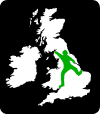
- The most recent issue to be published was 133
- For further information, please see Publishing/Despatch Schedule
- Database last updated on Tue, 03 Mar 2026 10:01:54 +0000
- Online access is currently available for all issues. Some of
the older issues are bit-map scans rather than digital copies.
journal scans.
- Online voting for CREG articles was withdrawn in June 2022. For info see
Voting for CREG articles
Contents of journal 52
June 2003
This page may take a few
seconds to load. Please wait ...
- CREG Journal
(PDF 8.3MB)
  Individual articles may be available below Individual articles may be available below
- Contents
-
- Newssheet
- On Future Constructibility; Rugby Radio Ceases Operations on 16kHz; Deregulation of CB Radio in the UK; PCBs for the Brian Pease radio-location beacon; CREG Award; Magazine binders; Diary Dates.
-
- A Caver's View of Remote Imaging
- Aerial photography of the entire UK is being published either electronically or as hardcopy. Imagery for other countries is also available, either from aircraft or satellite. Mike Bedford looks at what's on offer and how it may benefit cavers. (Note: there were problems in the printing process for this article. The illustrations are the wrong size and the captions are missing. A corrected version is available here(PDF 2123K).
-
- Cyfarchiadau o Grughywel - Greetings from Crickhowell
- Our spring 2003 field meet was held at the Chelsea Speleological Society's hut near Crickhowell in Wales. Richard Rushton describes the proceedings.
-
- Electronic Cave Surveying Instruments
- At the CREG field meet in March 2003, Wookey gave a talk on what the Group could do to help cave surveyors. This is an extended version of his presentation.
-
- First Impressions of a 3D Laser Scanner
- 3D laser scanners are the state of the art in professional surveying equipment. Mike Bedford was given the opportunity to see one in action underground and reports on his experiences.
-
- 3D Radiolocation Using a Single Station
- The satellite-based Global Positioning System (GPS) cannot be used underground, and similar low-frequency methods using time-of-flight are likely to be difficult to implement. The best method of achieving a similar 3D system is by monitoring field strength and direction. In this article, David Gibson describes how the distance, bearing and elevation of a surface-based transmitter beacon can (in theory) be determined from measurements at a single underground station.
-
- Towards 3D Radiolocation Using Two Stations
- Using two radiolocation beacon receivers at surveyed stations, it is possible to take readings of field strength and direction that allow the relative position of the transmitter to be derived without knowledge of its magnetic moment. Richard Rushton describes this technique, and his experimental verification in Eglwys Faen.
-
- A Bibliography of Cave Radiolocation
- David Gibson explains the state-of-the-art in radiolocation, and gives a list of 'further reading'.
-
- 2-Way Voice Communication with Cave Divers
- Commercial 32kHz voice communications equipment, used by divers to talk to the surface, was converted into through-the-earth radios and used for diver-to-surface voice communications in underwater Florida caves. Brian Pease reports.
-
- Using the HeyPhone with Primary Cells
- Although rechargeable lead-acid and nickel metal hydride cells and batteries are the most cost-effective way of powering the HeyPhone, primary cells do have their place. Mike Bedford looks at the advantage of using primaries and describes a suitable battery pack for the HeyPhone.
-
- A Wind-up Power Supply for the HeyPhone
- Consumer products ranging from portable radios to torches are now available with wind-up power supplies. Mike Bedford looks at Motorola's wind-up mobile phone power supply and describes how to adapt it for use with the HeyPhone.
-
- Inductance of Earth Antennas
- Chris Trayner wondered whether the bunched wire of an earth electrode antenna that was not fully deployed would affect its inductance significantly.
-
- Wet & Dry
- Julian Coward investigates the light transmission properties of plastic food boxes, and chooses one to house his flashguns. Column edited by Richard Rushton.
-
- Student Project Suggestions
- From time to time, we have produced lists of projects suitable for undergraduate students to undertake as part of their degree course. Here David Gibson gives some suggestions.
-
- Jean-Jacques Fauchez: Mission Accomplished!
- Jean-Jacques Fauchez (F6IDE), well known for his work on cave radio, was awarded the CREG prize posthumously in 2002. In May 2003 Rosy and John Rabson travelled to the Vercors to present the award to J-J's widow Luce.
-
- Letters to the Editor
- Readers have their say on NiCd Batteries, Building HeyPhones, Noise Shielding, Dowsing, Heyphone Antenna Leads, US Radio Amateurs and 5MHz-Band Channels, UK to Alaska on 136kHz, a Caver-proof Computer and PSTN/PMR446 Interfacing.
-

|

View Contents:

BCRA is a UK registered charity and is a constituent body of
the British Caving Association,
undertaking charitable activities on behalf of the BCA.
BCRA publishes a range of periodicals and books.
Click here for further information.
|
Searching
To Search our pages using Google, type a search
string in the box at the top of the page and hit your Return key
You can also search our publications catalogue at the British Caving Library
The CREG Journal Search Engine is a new, powerful search engine which will, sometime, be extended
to cover Cave & Karst Science. We have a keyword search facility on our Cave Science Indexes pages but this may be rather out-of-date.
|
For staff use: Link to Database
Show/Hide
download figures next to each item (if available and non-zero; you might need to refresh page first). Counters last
reset on Thu 03-Jan-2019 17:29:28 +00:00. The figures are non-unique
click-throughs.
|









